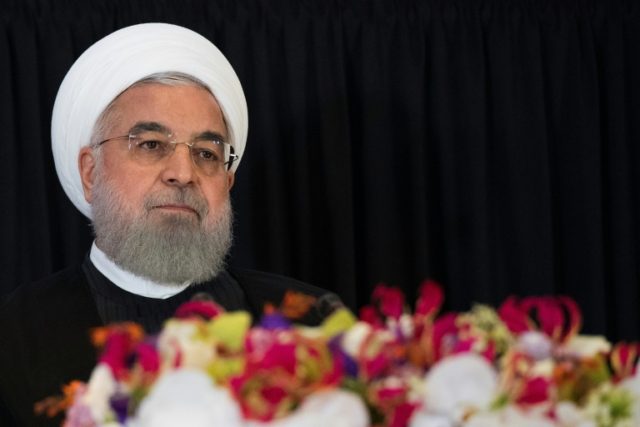Iran’s Foreign Minister Mohammad Javad Zarif announced on Sunday that his president, Hassan Rouhani, has planned his first-ever visit to Iraq, currently scheduled to occur on March 11.
Zarif is currently in Baghdad on a visit trailing his American counterpart, Secretary of State Mike Pompeo, who is on a tour of the Middle East widely believed to be meant to contain Iran’s influence in the region. Pompeo’s Iraq visit was not publicly scheduled before his arrival last week.
The Shiite-led government of Iraq has strengthened its ties to Iran in the wake of its struggle against the Sunni Islamic State terrorist group, most prominently by making the Popular Mobilization Forces (PMF), or Hashd al-Shaabi, an official wing of the Iraqi armed forces. The PMF is a majority-Shiite, Iranian-backed coalition of militias that rose to prominence fighting the Islamic State but have since turned on Sunni Arab locals and Kurds.
While some groups represent the Turkmen minority and have joined the PMF as a more efficient way to fight the Islamic State, groups like Asa’ib Ahl al-Haq (“League of the Righteous”) and the Hezbollah Brigades have close ties to Iran and have threatened the lives of American soldiers.
Iran’s Tasnim news reported that Zarif officially announced a date for Rouhani’s visit while meeting with Iraq’s foreign minister Mohamed Ali Alhakim and scheduling various talks with other government officials focusing on trade. The Iranian regime has struggled to maintain a stable economy in light of sanctions imposed by the U.S. government in response to violations to the 2015 Joint Comprehensive Plan of Action (JCPoA), or Iran nuclear deal.
Zarif did not provide any details of Rouhani’s visit, including whether he would limit his discussions to the Baghdad government or meet with the autonomous Kurdistan Regional Government (KRG) in Erbil. Pompeo met with both last week and Zarif has scheduled talks with both.
The event would be Rouhani’s first visit to Iraq.
In addition to the announcement, Zarif urged Iraq to continue to strengthen ties with Tehran, particularly economic ones, and to avoid the “failures” that come from cooperating with the United States.
“The Iranian-Iraqi ties are solid and we do not allow anyone to interfere in the relations between Tehran and Baghdad,” he stated.
“These failures have continued for the past 40 years and my proposal to countries (in the region) is to not bet on a losing horse,” Zarif reportedly suggested. “We are trying to find ways to overcome the inconveniences caused by the U.S.”
Alhakim, Tasnim noted, had remarked this month that he did not expect Iraq to abide by the international sanctions placed on Iran last November.
“These sanctions, the siege, or what is called the embargo, these are unilateral, not international. We are not obliged (to follow) them,” the outlet quoted him as saying.
While much of Zarif’s visit appeared focused on the U.S.’s role in the region, statements from the U.S. State Department did not specifically mention Iran as part of the dialogue between Pompeo and senior Iraqi officials, including Prime Minister Adil Abd al-Mahdi. Pompeo and al-Mahdi, for example, “discussed the recent territorial defeat of ISIS in Syria and the continuation of our cooperation with Iraqi Security Forces to ensure ISIS’ lasting defeat throughout the region,” according to the State Department.
“The Secretary emphasized U.S. support for the long-term bilateral partnership … Secretary Pompeo emphasized the U.S. commitment to addressing Iraq’s security challenges, including the continuation of our security partnership with Iraqi Security Forces,” the agency added in its release on the meeting.
The near-complete eradication of the Islamic State has stirred tensions between the United States and the PMF, members of which have rejected a continued American presence in the country. Iraq has exacerbated those tensions in part by expanding the PMF’s power. The Washington Post reported last week that the group is “enjoying unprecedented military and political power in Iraq,” beginning its expansion following the KRG’s 2017 independence referendum. The Iraqi government moved to return the multi-ethnic city of Kirkuk to Baghdad’s, not Erbil’s, control; the PMF did much of the occupation work.
According to the Post, the PMF has established “mafia-like practices” throughout majority Sunni areas, extorting local business by imposing extralegal “taxes” on them to allow them to continue to operate. “The militias are also deciding which Sunni families are allowed to return to their homes following battles against the Islamic State, say analysts who study the groups,” the newspaper adds.
Some PMF militias have taken to openly threatening U.S. troops following their accumulation of power.
“That idiot Trump must realize that Iraq’s sovereignty was achieved with blood and that no [American] bases will be built in the land of resistance and martyrs … The [Iraqi] government is obligated now to drive out the American forces that harm the country’s sovereignty,” an Asa’ib Ahl al-Haq spokesman was quoted as saying last month.

COMMENTS
Please let us know if you're having issues with commenting.